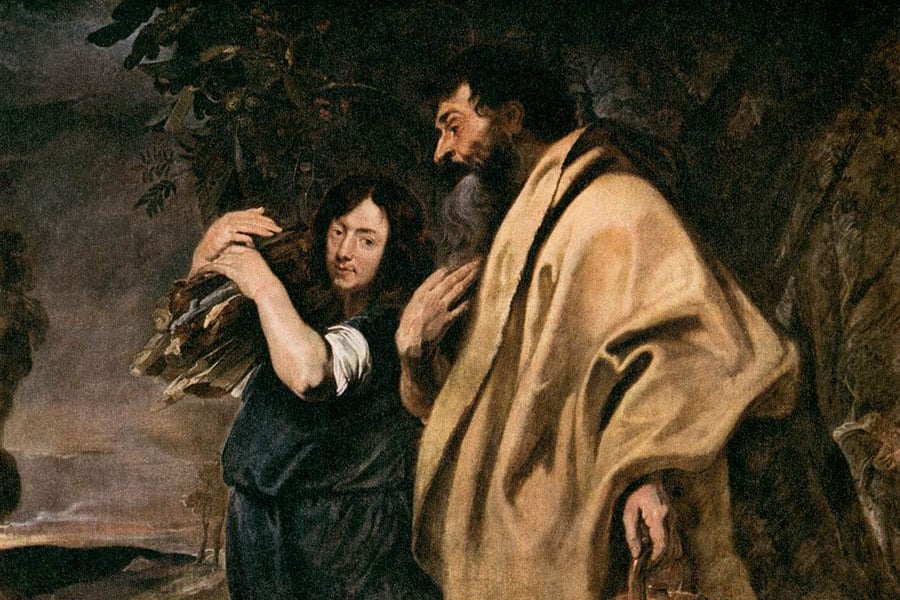Let us Lectio: Both Victim and Priest

Abraham and Isaac by Anthony van Dyck, c. 1617.
Easter Vigil in the Holy Night of Easter, April 20, 2019
Steps to Lectio Divina
Start by using these steps to reflect on the Scripture verse. Then read my meditation slowly.
Lectio: Having asked for the grace to hear God's word, read the passage twice.
Meditatio: During the second reading, pause whenever so moved and reflect on a word, a sentence, or an image that strikes you.
Oratio: Speak directly to God, and open your reflection to Him.
Contemplatio: Listen contemplatively for any response God might choose to make. Remember that God responds to us at times with loving silence.
The Scripture
From the Second Reading for April 20, 2019 Easter Vigil in the Holy Night of Easter (Genesis 22:1-18)
God put Abraham to the test.
He called to him, "Abraham!"
"Here I am, " he replied.
Then God said:
"Take your son Isaac, your only one, whom you love,
and go to the land of Moriah.
There you shall offer him up as a holocaust
on a height that I will point out to you."
Early the next morning Abraham saddled his donkey,
took with him his son Isaac and two of his servants as well,
and with the wood that he had cut for the holocaust,
set out for the place of which God had told him.
On the third day Abraham got sight of the place from afar.
Then he said to his servants:
"Both of you stay here with the donkey,
while the boy and I go on over yonder.
We will worship and then come back to you."
Thereupon Abraham took the wood for the holocaust
and laid it on his son Isaac's shoulders,
while he himself carried the fire and the knife.
As the two walked on together, Isaac spoke to his father Abraham:
"Father!" Isaac said.
"Yes, son, " he replied.
Isaac continued, "Here are the fire and the wood,
but where is the sheep for the holocaust?"
"Son," Abraham answered,
"God himself will provide the sheep for the holocaust."
Then the two continued going forward.
When they came to the place of which God had told him,
Abraham built an altar there and arranged the wood on it.
Next he tied up his son Isaac,
and put him on top of the wood on the altar.
Then he reached out and took the knife to slaughter his son.
But the LORD's messenger called to him from heaven,
"Abraham, Abraham!"
"Here I am!" he answered.
"Do not lay your hand on the boy," said the messenger.
"Do not do the least thing to him.
I know now how devoted you are to God,
since you did not withhold from me your own beloved son."
As Abraham looked about,
he spied a ram caught by its horns in the thicket.
So he went and took the ram
and offered it up as a holocaust in place of his son.
Abraham named the site Yahweh-yireh;
hence people now say, "On the mountain the LORD will see."
Again the LORD's messenger called to Abraham from heaven and said:
"I swear by myself, declares the LORD,
that because you acted as you did
in not withholding from me your beloved son,
I will bless you abundantly
and make your descendants as countless
as the stars of the sky and the sands of the seashore;
your descendants shall take possession
of the gates of their enemies,
and in your descendants all the nations of the earth shall find blessing;
all this because you obeyed my command."
Reflection
As one of the first readings of the vigil, the sacrifice of Abraham and Isaac is recalled, which in many ways both foretells and is perfected by the sacrifice of Jesus on the cross.
In his old age, Abraham was promised a son not only to continue his family name but that through him he would become the father of nations. To the ancient mind, and especially in these circumstances, to give up his son would have meant to be asked to give up this promise. To lose his son would have been to lose himself.
Ancient people for better or worse intuitively understood that the only authentic sacrifice to God, to whom we owe our life, would have to be precious enough to represent our entire lives. But God does not want the spillage of the blood of Isaac. He wants our faith, gratitude, and obedience, which is why He provides a substitute of a ram to stand in Isaac’s place, to symbolize that which is so precious as to represent our very selves. Though Abraham offered his mortal son up to God, the Lord held back the hand of Abraham for He knew a far better sacrifice was to come. God knew that one day He would give up His only begotten and immortal Son as a sacrifice for all of us.
Both Isaac and Jesus willingly were bound for the sacrifice. And they both carried the wood for the sacrifice up Mount Moriah, which would be later known as the location of the temple in Jerusalem (cf. 2 Chronicles 3:1). As such, in making the distinct act of preparing for the sacrifice, they both act as victim and priest. However, unlike Isaac, Jesus approached freely and with full knowledge of what the sacrifice would require of Him. Also, unlike Isaac, Jesus did in fact brave the pangs of death and accomplished the sacrifice. God returned Isaac to Abraham in fulfillment of the promise of God, whereas Jesus resurrected from the dead and in so doing stands eternally as our High Priest.

Callie Nowlin, MTS, is a regular contributor to the North Texas Catholic.
Scripture texts in this work are taken from the New American Bible, revised edition © 2010, 1991, 1986, 1970 Confraternity of Christian Doctrine, Washington, D.C. and are used by permission of the copyright owner. All Rights Reserved. No part of the New American Bible may be reproduced in any form without permission in writing from the copyright owner.
